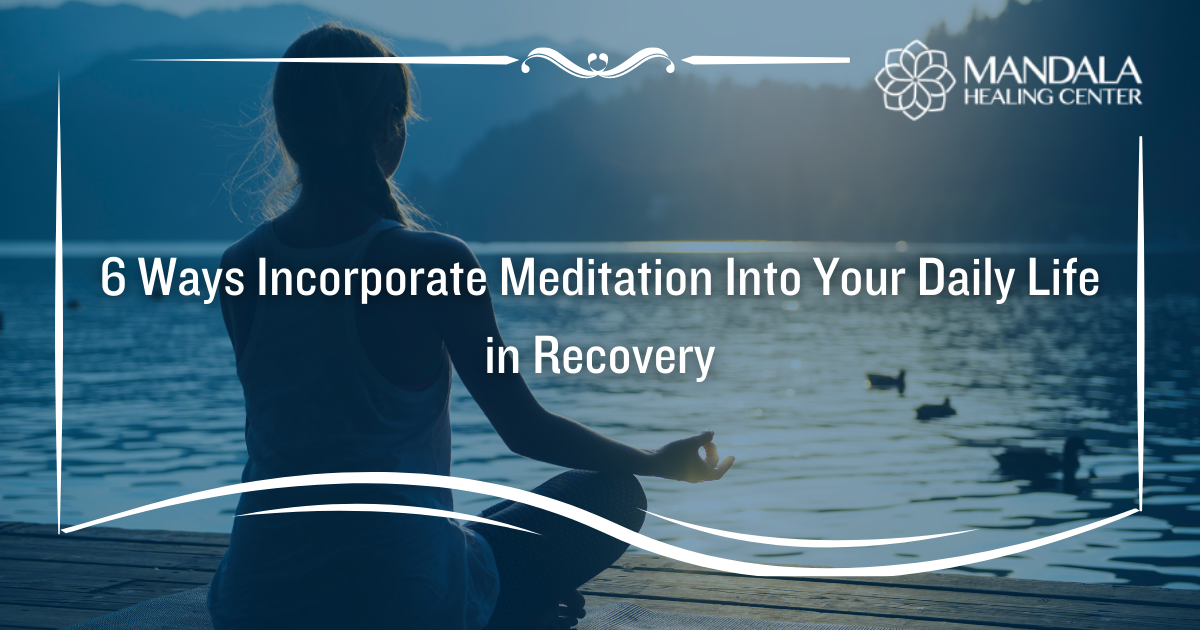Addiction is a disease that affects the mind, body, and spirit. A holistic approach to recovery is one that brings these three areas of your life into balance using comprehensive therapeutic techniques.
Meditation is one holistic therapy that is used during addiction treatment to help heal the mind, body, and soul while promoting healthy habits and coping skills that can be used throughout recovery. While using meditation during rehab may be easy because you are separated from the real world and guided by treatment professionals, incorporating meditation into your daily life in recovery can be challenging.
If you’re like most people today, you live a fast-paced life and you’re very busy. When trying to balance your sobriety-related obligations with family, work, school, social life, and self-care, things like meditation can easily get pushed to the wayside. However, using meditation as a regular part of your recovery and self-care routine can improve virtually every aspect of your life.
Here are 6 simple ways to incorporate meditation into your daily life in recovery.
1. Wake Up 10 Minutes Earlier
Meditation doesn’t have to take up a lot of your time to be beneficial. As little as 5-10 minutes of meditation in the morning can help you start your day the right way. [1]
Consider setting your alarm 5-10 minutes earlier than usual to spend some time alone in a quiet, still meditation. Focus on your breathing, soak up the beautiful sunrise, or even listen to a short guided meditation on the internet.
After meditating, you may find yourself more relaxed, energized, and ready to seize the day. If you woke up craving a drink or a drug, you may find that the feeling has passed after your meditation is over.
2. Turn Exercise into Meditation
Whether you are someone who hits the gym religiously or someone who simply enjoys a relaxing stroll through the neighborhood, try turning your daily exercise or movement into meditation.
Unplug your headphones, silence your cell phone, and focus on the movements of your body. Focus on taking deep, oxygenated breaths, and imagine the breath you inhale fueling your muscles and blood with the oxygen it needs to keep your body healthy.
Exercise and physical activity are great coping skills for addiction recovery. They can alleviate stress, build self-esteem, and so much more.[2] When exercise is turned into meditation, also known as movement meditation, it can also help alleviate drug and alcohol cravings.
3. Experiment With New Styles of Meditation in Recovery
Learning how to incorporate meditation into your daily life in recovery is supposed to be fulfilling and beneficial. It isn’t supposed to be something that you dread. If you try one type of meditation and feel as though it just isn’t right for you, that’s OK!
There are several different approaches and styles to meditation, and what works for one person may not work for another. When you’re just getting started with the practice, be sure to experiment with new styles and approaches to find the one you like the best.
4. Turn Daily Chores into Meditation
Few people enjoy chores, but everyone has to do them. Whether it is doing the dishes, folding clothes, or mopping the floor, you can try turning your chores into meditation simply by adding an element of focus into the chore.
For example, if you are folding clothes, count and focus on your breaths while folding each piece. If you are doing dishes, repeat a mantra in your head. Any type of repetitive chore can easily be turned into mindfulness.
5. Use a Podcast, App, or YouTube to Guide Your Meditations
Solo meditation isn’t always easy, especially in the beginning. If you don’t feel comfortable meditating on your own, consider downloading an app or podcast or subscribing to a YouTube channel that offers guided meditations. These high-tech solutions can not only guide you through your meditation, but they can actually remind you to meditate each day via push notifications.
6. Meditation: On, Judgment: Off!
When you first start daily meditation, you may struggle to quiet your mind. You may worry that you’re thinking too much, getting distracted too easily, or that you simply aren’t doing it right. We’re here to let you in on a little secret–there is no right or wrong way to meditate.
If you want to be successful in meditation, all you have to do is turn off your self-judgment, stop criticizing yourself, and keep going. It will be easier to find mental stillness and positivity on some days than others, but that doesn’t mean you should give up.
It’s true that practice makes perfect. The more you practice, the more the benefits of meditation in recovery will show up in your daily life.
Learn How to Incorporate Meditation Into Your Daily Life in Recovery at Mandala Healing Center
At Mandala Healing Center, we believe mindfulness meditation is a powerful tool for healing and an important component of addiction recovery. Being able to make the conscious choice to live in the present moment is invaluable to those struggling with drug or alcohol addiction. That’s why our holistic drug rehab program uses meditation to help you heal from addiction.
If you or a loved one are ready to begin your recovery, please contact us today. An admissions coordinator is available to help you get the treatment you deserve.
References:












